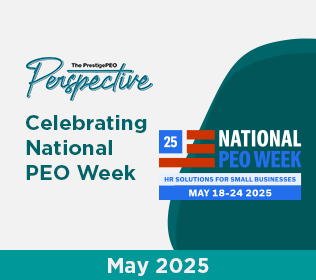Your guide to the latest HR news in a bite-sized package!
Our Prestige Perspective newsletter will share our ideas for inspiring your team, provide answers to frequently asked questions, and keep you updated on the HR information you need to know. We hope you find this newsletter helpful! If you have any questions or would like to learn more about partnering with PrestigePEO, please feel free to contact us at any time.
Remember to Complete Your Sexual Harassment Training
As the end of the year approaches, it’s a good time to start planning an annual sexual harassment training for your employees. If you are in California, Connecticut, Delaware, Illinois, Maine, Massachusetts, or New York, your state requires sexual harassment training. State requirements vary regarding training content, the length of training time required, and training frequency.
Additionally, if you have remote employees operating in other states, you must comply with their state’s sexual harassment requirements. Even if your state doesn’t require sexual harassment training, we highly recommend providing it for the safety of your team members. At PrestigePEO, we’re here to help with your compliance and training needs. When your partner with Prestige, we will give you a dedicated team of HR specialists who can help you develop a training program that is both compliant and effective.
How Can Employers Address "Quiet Quitting"
We’re hearing less about the Great Resignation, and the new HR hot topic is “quiet quitting.” This concept refers to an employee that appears to be doing only the bare minimum of work to get by. These two phenomena are not that different – they both involve workers who are unhappy with their jobs and feel that they can’t speak up. Instead, they either find a new job or start to underachieve. Rather than blame these frustrated workers, consider how you can help, reinspire, and reengage them in your company culture.
Perform an employee survey to see where the pain points lie in your organization. Take a look at your employee benefits and your PTO package – are your competitors offering better? Finally, when was the last time you checked in with this “quiet quitter”? Maybe they feel stuck in a rut and have passions elsewhere, or perhaps they no longer feel appreciated. Quiet quitters are not a lost cause and should not be blamed without finding the root source of their dissatisfaction.
DEI INITIATIVE
The Financial Literacy Racial Disparity: Acknowledging the Issues, Addressing the Causes, and How Implementing DEI Strategies Can Help
The month of October recognizes the importance of financial planning. October is both Economic Education month and National Financial Planning month. It may seem that these themes do not relate to our DEI efforts. However, when we view these themes from a different perspective, we can see that focusing on diversity helps to flush this topic out and provide a complete picture. Without access to education on financial literacy, many people grow up to have an incomplete understanding of how to plan their future. In our latest blog post, we’ll explore the racial disparities in access to economic education and what the HR and SMB communities can do to combat them.
THE SCOOP: HR NEWS
HR in 15 Podcast
Give us 15 Minutes, and We’ll Give You Expert Answers to All Things HR
HR in 15 is our podcast where we talk discuss important HR topics with leading subject matter experts. The episodes cover the latest HR news and any issues or concerns you may be dealing with in your office. Be sure to tune in for an informative 15 minutes!
Implementing a 4-Day Work Week
The 5-day work week has been a familiar concept since the early 1900s, and it’s hard to imagine life without it. But the 5-day week concept was originally designed with the idea that the working individual had a spouse at home to take care of the domestic duties, and this isn’t nearly as common today. This leads to a burnt-out workforce with an uneven work-life balance. In comes the concept of a 4-day work week – but how would you implement it? In this episode of HR in 15, we continue our conversation with Joe O’Connor, Chief Executive Officer of 4 Day Week Global, and host Rhonda Wheelous, Director of Client Services at PrestigePEO.









